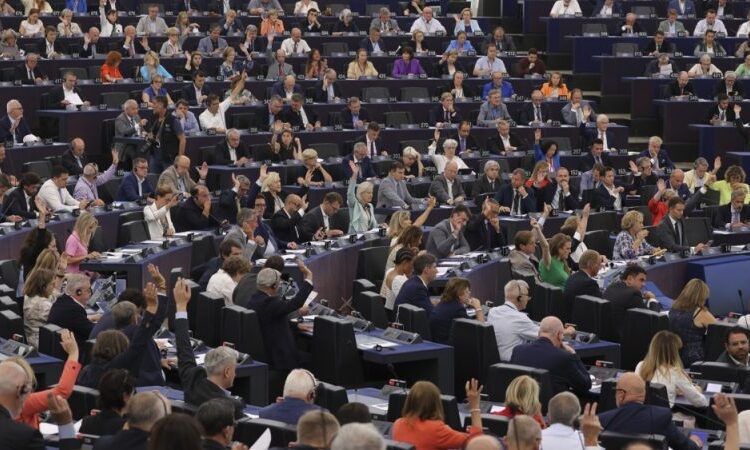
Against the backdrop of the war in Ukraine, the European Parliament has backed the Commission’s proposal to spend more money on defence in next year’s EU budget even though financial resources are scarce.
The push to boost the defence-related budgets despite tight EU budget strings comes after the war started in next-door Ukraine and as the EU capitals are pledging large budget increases to arm up against Russia and support Ukraine, among other neighbours.
According to the compromise agreement on the 2024 EU budget seen by Euractiv, the Parliament’s negotiators would like to see a €625 million increase for the European Defence Fund (EDF), and an additional €45 million for military mobility.
This move, which comes on top of the EU executive’s initial budget proposal, would back the Commission’s proposal of the seven-year budget framework, the multi-annual financial framework (MFF for 2021-2027), and the sovereignty fund (STEP) starting in 2024.
During the 2020 negotiations on the 2021-2027 financial framework, the defence budgets were among the first ones to be slashed by the leaders.
But “the war has made “business as usual” in the EU defence policy not possible any more,” Victor Negrescu (S&D, Romania), shadow rapporteur on the 2024 budget, told Euractiv.
Table on the MFF review and STEP adoption
This way, the European Parliament “aligns its position” with the European Commission’s, Siegfried Muresan (EPP, Romania), rapporteur on the EU budget, told Euractiv in an interview.
In practice, the European Parliament is adopting a 2024 budget already including the additional funding proposed under the MFF review for 2024-2027 and STEP (formerly known as the Sovereignty fund), even though they are still under negotiation amongst the member states.
The proposed review came on top of the 2024 budget the EU executive initially tabled.
If the Council backs the Parliament and Commission’s reviewed position, the EDF would benefit from €1,263 billion and the military mobility programme from €286 million in 2024.
Backdrop against Ukraine war
“The defence budget is one of the European Parliament’s priorities because we want to continue to support Ukraine,” said Fabienne Keller (Renew, France).
Muresan said the MFF review and the STEP proposals “follow the war in Ukraine, because [the Commission] has rightly understood that defence is important”, especially “that we need to invest more in research”.
“There is an understanding that it makes sense to pull resources together, to invest into research, to come up with the best technologies the most cost-effective way possible, and then to share the benefits of this defence research amongst EU member states,” Muresan added. “I think it makes sense, it will make us safer.”
On military mobility, Keller explained that the move to increase resources follows a pattern: “We have clearly seen that the budget allocated for 2023 is insufficient, particularly for military mobility, which has had to be replenished several times this year”.
Easy deal with the Council?
“This increase is not at the expense of other programmes,” Keller said. while Muresan explained there would be “some very moderate increases of €100 million for the Connecting Europe Facility (CEF) for large infrastructure projects, €100 million euros for Erasmus, about €100 million for some lines in Horizon Europe”.
However, the EU “must find the balance between providing the necessary funding for increased capacity of the European defence industry, and production of armament for ourselves and our partners’ needs, without depleting existing programmes and funds under the cohesion policy,” and protect workers’ rights, Muresan said.
On the defence budget hikes, he said there would be “a unanimous agreement between the three institutions to support this proposal because everyone understands after the Russian invasion in Ukraine that this is important”.
Keller, however, cautioned that “budget negotiations with the Council are always a complex exercise, but realistically the European Parliament must push for an ambitious MFF review”.
[Edited by Zoran Radosavljevic]







